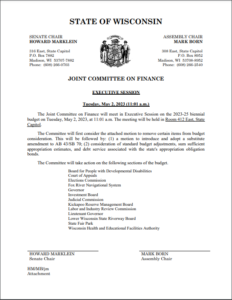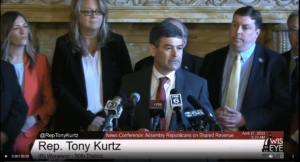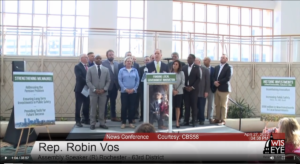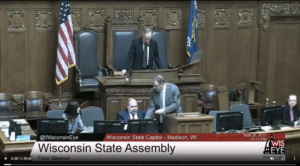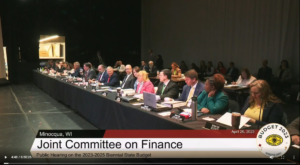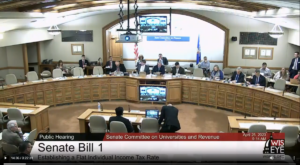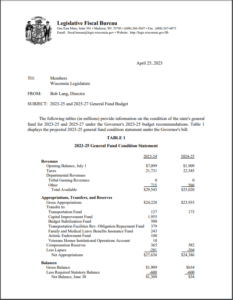
In this update:
- Budget Updates
- Legislative Updates
- Election Updates
- A Look at the Week Ahead
- Fundraising Opportunities
Budget Updates
Upcoming JFC omnibus budget motion
On Tuesday, May 2, the Joint Committee on Finance will meet in Executive Session on the 2023-25 biennial budget. The Committee will consider a motion to remove certain items from budget consideration followed by a motion to introduce and adopt a substitute budget amendment.
Click here to view the JFC meeting notice and omnibus budget motion.
Legislative Updates
Assembly GOP announces shared revenue, sales tax proposals
On Thursday, Assembly Republicans held a press conference at the Capitol to announce their version of a proposal to increase shared revenue payments to local governments across the state. The actual proposal has not yet been released. According to JFC co-chair Mark Born and JFC member Tony Kurtz, full details of the proposal should be released early next week. The plan reportedly includes two buckets of money to increase funding to municipalities through a newly-established Local Government Segregated Account (LGSA), as well as a third bucket called the “Innovation Fund” that offers funding to municipalities for realizing savings through consolidating services. Components of the shared revenue plan also reportedly include:
- 20% of the state’s sales tax would be dedicated to the LGSA. This amounts to $1.5 billion in 2024 and means whenever the state’s sales tax collections increase, corresponding increases to shared revenue will also occur.
- $747.1 million would be used for existing shared revenue payments to local governments. Each municipality would continue to receive its current level of shared revenue funding. The rules governing the use of these funds would be the same as for existing shared revenue payments.
- $227 million would go toward an increase, or “equalization” adjustment, for county and municipal aid. According to Rep. Kurtz, each community would receive at least a 10% increase. $50 million would go to counties while the rest would be divided among cities, villages, and towns. These funds would only be allowed to be spent on law enforcement, fire protection, emergency medical services, public works, and transportation.
- $300 million would be deposited into an “Innovation Fund” that would reward municipalities that realize savings through consolidating services.
- $347.4 million would be used to offset property tax revenue local governments would lose from a full repeal of the personal property tax.
- $12.8 million in additional funding for emergency medical services provided by local governments.
- Increasing law enforcement training reimbursements from $160 per officer to $320 per officer.
The Assembly GOP proposal reportedly would also include the following stipulations:
- Local governments would be required to maintain funding for law enforcement, fire, and EMS at the same level as the year before.
- Local public health officials would be prohibited from closing a business for longer than 14 days in response to an outbreak or epidemic unless authorized to do so by their local town, village, city, or county board.
Sales Tax
In addition to the shared revenue proposal, a plan to help Milwaukee County and the city meet its pension obligations was also announced. Like the shared revenue plan, the actual proposal for the sales tax plan has yet to be released. At a press conference in Milwaukee late Thursday afternoon, Assembly Speaker Robin Vos and Majority Leader Tyler August were joined by several GOP legislators, as well as Milwaukee Mayor Cavalier Johnson, Milwaukee County Executive David Crowley, and other local elected officials from across the area to discuss the Assembly GOP’s proposal. The plan would reportedly allow the city of Milwaukee to levy a 2% sales tax and allow Milwaukee County to add an additional .375% sales tax to its existing .5% sales tax. Both taxes would need to be approved by voters via referendum. County Executive Crowley and Mayor Johnson both noted there were still disagreements over some of the provisions and that “this is not the finish line.”
The Assembly GOP plan reportedly would also include the following stipulations:
- Revenue generated by the sales tax would be used to meet the county and city’s separate pension obligations. New city and Milwaukee county employees would be added to the state’s pension system. The sales tax would sunset after 30 years or when the pension obligations are met, whichever comes first.
- 10% of the revenue generated by the sales tax must be used to maintain the level of police, fire, and EMS that existed as of April 1. Any sales tax revenues that exceed pension obligations must be put towards increasing the number of police and firefighters.
- City property tax dollars would be prohibited from being spent on Milwaukee’s streetcar.
- Capping city and county spending on cultural or entertainment items to 5% of the total budget. Parks, zoo, transit or charter schools approved by the City Council would not be included.
- Requiring a 2/3 majority from the city council or county board to approve new spending or to increase the number of positions.
- Requiring the Milwaukee Public School District Board to have a school resource officer present at every school during normal school hours.
- Requiring at least one member of the Milwaukee Fire and Police Commission (FPC) to be selected from a list approved by the police union and another from the firefighters union.
- Prohibiting the FPC from setting policies for the Milwaukee Police Department and instead delegating that power to the Police Chief in consultation with the mayor and city council.
- Prohibiting the city from using property taxes to fund any position that has a primary responsibility of promoting individuals or groups based on their race, color, ancestry, national origin or sexual orientation.
Reaction to shared revenue and sales tax proposals
 Governor Tony Evers (D-Plymouth): A spokesperson said Gov. Evers would not be providing comment until the actual proposal is released.
Governor Tony Evers (D-Plymouth): A spokesperson said Gov. Evers would not be providing comment until the actual proposal is released.
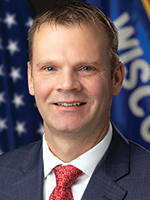 Senate Majority Leader Devin LeMahieu (R-Oostburg): “Over the last few months there have been substantive, good-faith negotiations between both houses of the legislature and local government stakeholders from across the state. The Assembly announcement today is the product of those negotiations; however the final details are still being worked out. The Senate is looking forward to continuing to find a responsible way to make a generational investment in local governments throughout the state.”
Senate Majority Leader Devin LeMahieu (R-Oostburg): “Over the last few months there have been substantive, good-faith negotiations between both houses of the legislature and local government stakeholders from across the state. The Assembly announcement today is the product of those negotiations; however the final details are still being worked out. The Senate is looking forward to continuing to find a responsible way to make a generational investment in local governments throughout the state.”
 JFC Assembly Co-Chair Mark Born (R-Beaver Dam): “Working together to find common solutions can be challenging, especially when the needs of communities throughout our state are so diverse. I am proud of the work that has gone into this legislation that will make a meaningful impact for communities in Wisconsin.”
JFC Assembly Co-Chair Mark Born (R-Beaver Dam): “Working together to find common solutions can be challenging, especially when the needs of communities throughout our state are so diverse. I am proud of the work that has gone into this legislation that will make a meaningful impact for communities in Wisconsin.”
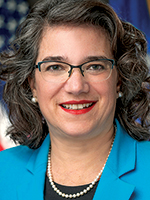 Senate Minority Leader Melissa Agard (D-Madison): “Republicans should be embarrassed by their announcement today. It is clear that they have no consensus on a plan to adequately fund our communities. Our local governments deserve better than the games Republicans are playing.”
Senate Minority Leader Melissa Agard (D-Madison): “Republicans should be embarrassed by their announcement today. It is clear that they have no consensus on a plan to adequately fund our communities. Our local governments deserve better than the games Republicans are playing.”
 Assembly Minority Leader Greta Neubauer (D-Racine): “We still haven’t seen a bill draft from the GOP, and there is a lot more work to be done to ensure that we have a solution that works for the people of Wisconsin. We look forward to continuing these conversations to give our communities the support they need to be successful.”
Assembly Minority Leader Greta Neubauer (D-Racine): “We still haven’t seen a bill draft from the GOP, and there is a lot more work to be done to ensure that we have a solution that works for the people of Wisconsin. We look forward to continuing these conversations to give our communities the support they need to be successful.”
 City of Milwaukee Mayor Cavalier Johnson (D): “Today is a monumental step forward for Milwaukee, as we take our first steps towards improving our fiscal situation to ensure a local government that serves its people. Thank you to all the partners who were able to make this happen.”
City of Milwaukee Mayor Cavalier Johnson (D): “Today is a monumental step forward for Milwaukee, as we take our first steps towards improving our fiscal situation to ensure a local government that serves its people. Thank you to all the partners who were able to make this happen.”
 Milwaukee County Executive David Crowley (D): “The shape of this proposed legislation represents a punctuation mark in resetting the relationship between the Legislature and leaders in the Milwaukee County region. There is still more work to be done, but this proposal has the potential to bring needed funds to address our unfunded liabilities – and in turn avoid a fiscal cliff that would jeopardize investments needed along the public safety continuum and core government services.”
Milwaukee County Executive David Crowley (D): “The shape of this proposed legislation represents a punctuation mark in resetting the relationship between the Legislature and leaders in the Milwaukee County region. There is still more work to be done, but this proposal has the potential to bring needed funds to address our unfunded liabilities – and in turn avoid a fiscal cliff that would jeopardize investments needed along the public safety continuum and core government services.”
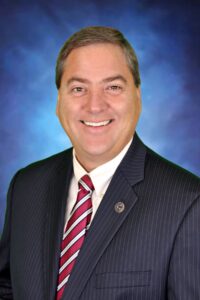 Waukesha County Executive Paul Farrow (R): “Today, Assembly Republicans handed many Democrats exactly what they’ve wanted, a bailout of Milwaukee’s out of control pension fund in the form of sales tax increases for the City of Milwaukee and Milwaukee County. Unfortunately, their plan doesn’t give us what we needed; a solution to the problems created by an outdated state revenue formula and decades of unfunded state mandates. The new money provided under the proposal falls far short of what a low-tax county like Waukesha needs to fight crime, support our 911 dispatchers, and keep our roads and the public safe. In fact, if unchanged, the new spending proposal would barely cover the cost of inflation in one year of our county budget. Making matters worse, the plan attaches just enough strings to tie our hands and prevent us from using the funds in the best way possible.“
Waukesha County Executive Paul Farrow (R): “Today, Assembly Republicans handed many Democrats exactly what they’ve wanted, a bailout of Milwaukee’s out of control pension fund in the form of sales tax increases for the City of Milwaukee and Milwaukee County. Unfortunately, their plan doesn’t give us what we needed; a solution to the problems created by an outdated state revenue formula and decades of unfunded state mandates. The new money provided under the proposal falls far short of what a low-tax county like Waukesha needs to fight crime, support our 911 dispatchers, and keep our roads and the public safe. In fact, if unchanged, the new spending proposal would barely cover the cost of inflation in one year of our county budget. Making matters worse, the plan attaches just enough strings to tie our hands and prevent us from using the funds in the best way possible.“
Assembly holds floor session
On Tuesday the Assembly held a floor session where they voted on 8 bills and 5 resolutions. All bills passed on party lines and will now be sent to the Senate for consideration. Notably, the Assembly passed a bill that would require the Department of Health Services to review the eligibility of BadgerCare patients every 6 months and remove all individuals who do not qualify. On the passage, the Chair of the Committee on Health, Aging and Long-Term Care, Rep. Clint Moses (R), stated, “This bill will assure the integrity of the program so that those funds are going to those individuals who actually are eligible and truly needy, especially with the massive growth of the program over the COVID pandemic.” Rep. Vining (D) argued that the process leading up to the floor vote was “embarrassing,” noting the bill authors did not testify on the bill for the committee hearing, and information about its fiscal impact was not provided. She also shared that one of her committee colleagues said the bill wasn’t “ready for prime time,” but still supported it. “That’s precisely not what’s supposed to happen in committee,” Rep. Vining said.
The Assembly also passed a bill that would prohibit local governments from using public funds for guaranteed income programs, and one that changes the maximum number of weeks of regular unemployment insurance (UI) benefits payable to an eligible claimant who is totally unemployed to an amount that varies depending upon the seasonally adjusted statewide unemployment rate.
The Assembly also passed the following bills:
- AB 147: Passed 60-35
- Makes a number of changes to unemployment insurance law, including clarifying what qualifies as misconduct and requiring DWD to conduct random audits of at least 50 percent of all work search actions. It also requires the Joint Finance Committee to be notified of any UI benefit increases provided through an act of Congress or by executive action of the president.
- AB 149: Passed 60-35
- Makes several changes to unemployment insurance law. It would allow employees to report to DWD when someone declines or fails to respond to an interview or job offer, misses a job interview without attempting to reschedule or when a UI claimant is unavailable for or can’t perform work during a given week. It would also allow employees to report, under certain circumstances, if an employee with UI benefits doesn’t return to work. DWD would be required to investigate the reports to determine UI eligibility.
- AB 151: Passed 60-35
- Requires state agencies and certain businesses to track and report on the performance of workforce development programs or activities they operate, oversee or coordinate.
JFC holds final listening session
On Wednesday the Joint Finance Committee held their fourth and final budget listening session in Minocqua. While many topics were discussed including the UW system, Shared Revenue, and the Milwaukee Brewers Stadium, two of the most prevalent matters discussed were K-12 funding and BadgerCare expansion. On K-12 funding, representatives from multiple districts including Northland Pines, Chequamegon, Crandon, and Antigo spoke of needed changes to state funding for schools. “Antigo School District’s mission is to ensure high levels of learning through high-quality instruction. This is only doable by recruiting and retaining exceptional teachers which is not even an option when there’s an exponential gap in funding across districts, by increasing the low revenue ceiling, you would provide an equal opportunity for all students to receive the education they deserve regardless of their zip code,” said KatieAnne Ostrenga, Antigo’s Business Services Director. Superintendents also cited hiring challenges, special education aid, and sparsity aid as other issues facing their districts.
On BadgerCare expansion, one woman explained that once she and her husband turned 65, they made just $100 too much to qualify for the program. She explained, “So we decided to get divorced. This separated our incomes and made it possible for each of us to be eligible for Medicaid and still earn an additional $600 without losing our eligibility. We called it ‘living in sin for the win’. My adult kids thought it was hilarious. My mom cried.” She followed up with support for the state to accept more federal dollars, saying, “If Wisconsin accepts the BadgerCare expansion money and raises the income eligibility, both of us, as able-bodied seniors could get part-time jobs to earn up to $459 a month each and still have healthcare. This could help a mom-and-pop shop in Tomahawk stay open and the money we earned would go back into the community.”
Senate committee hears testimony on personal property tax repeal, flat income tax
The Senate Committee on Universities and Revenue held a public hearing on Tuesday where members listened to testimony on repealing the personal property tax, as well as establishing a flat income tax. The hearing came shortly after Sen. Duey Stroebel (R-Saukville) released a new version of a bill he introduced earlier in the year seeking to repeal the personal property tax. Sen. Stroebel said he crafted the amendment to address technical concerns the Dept. of Revenue (DOR) had with the original legislation. Sen. Strobel called the updated legislation “a bipartisan agreement on the technical language necessary to repeal the personal property tax.”
During Tuesday’s public hearing, DOR Secretary Peter Barca submitted written testimony to the committee that acknowledged Sen. Stroebel’s amended bill resolved the technical concerns DOR had with the repeal, but Sec. Barca also stressed that three outstanding issues remain. Those issues are “the backfilling of local government, and transportation fund revenues, as well as the administrative costs to DOR.” Details on how DOR recommends addressing those outstanding issues were not included in the testimony.
Last session, Gov. Evers vetoed a similar bill from the GOP that would have repealed the personal property tax, claiming the “haphazard process by which the bill was drafted and passed…could have had problematic ramifications for railroad taxes and the manufacturing and agriculture credit, as well as the potential for the state to lose millions in taxes owed by utility companies.” Gov. Evers and fellow Democrats in the legislature then announced their own set of bills to repeal the tax, but neither piece of Democratic legislation received a public hearing or a vote and subsequently died in committee.
In his 2023-25 executive budget, Gov. Evers recommends repealing the remainder of the personal property tax beginning in calendar year 2024. Sec. Barca referenced the governor’s support in his testimony, writing “As you are aware, the Governor has been supportive of repealing the personal property tax. In fact, the language for the repeal was put in the Governor’s 2023-25 budget which ensures that local government funding is held-harmless by the repeal.”
Flat Tax
The committee also held a public hearing on SB 1, a bill that would establish a flat income tax rate for the state. The proposal, backed by Senate Majority Leader Devin LeMahieu and other Senate Republicans, calls for a flat tax rate of 3.2% phased in over a four-year period. A memo from the Legislative Fiscal Bureau found the proposal would reduce state tax collections by $2.1 billion in 2023-24 and $2.8 billion in 2024-25. By 2025-26 the cost would rise to $4.3 billion and in 2025-26 and annually thereafter it would be $5 billion. “What’s important to us is reducing taxes on all Wisconsin taxpayers, not just credits or low- to middle-income taxpayers,” Sen. LeMahieu told reporters after the hearing.
Gov. Evers has said on several occasions that he would veto any budget passed by the Legislature that includes a flat tax. “Their initial talking around a flat tax — that’s a poison pill for me,” Gov. Evers said. “I want a 10 percent middle class tax cut.” During his testimony Tuesday, Sen. LeMahieu said he’d eventually like to completely eliminate the income tax, but acknowledged the uphill battle even his flat income tax proposal faces from the governor, telling the committee “I realize we maybe have the wrong governor for that…We may have the wrong governor for this bill as well.”
LFB releases memo on general fund budget
The Legislative Fiscal Bureau (LFB) has released a new memo outlining the impacts of Governor Evers’ proposed budget on the state’s general fund. The memo, titled “2023-25 and 2025-27 General Fund Budget” shows the state starting 2023-24 with a $7.1 billion surplus, as well as additional revenues that altogether total $29.5 billion. According to the memo, Gov. Evers’ proposed budget would spend roughly $27.6 billion during the same time period, leaving the state with $1.9 billion in the general fund. By 2024-25, the memo notes Gov. Evers’ spending proposals would exceed revenues by nearly $1.3 billion when not taking into account the $1.9 billion left in the general fund from the prior year. With the $1.9 billion opening balance included, the state’s general fund would end 2024-2025 with $634 million, but $600 million would be required for the statutory balance, so only $34 million would actually be available for spending in the 2025-27 biennium.
For the 2025-27 biennium, the LFB forecasts Gov. Evers’ current budget recommendations would bring $47.1 billion in total revenue while spending $51.2 billion, leaving a general fund deficit of nearly $4.1 billion. However, the memo notes the projections for 2025-27 are based on commitments under current law and Gov. Evers’ 2023-2025 budget recommendations. The memo states further “No assumptions are made regarding revenue modifications in 2025-27 due to such unknowns as future law changes or economic factors. Likewise, no assumptions are made to appropriations regarding changes in caseloads, population estimates, enrollments, employee compensation, or inflation.” The memo concludes with LFB noting the state’s “Rainy Day Fund” would end the 2023-25 biennium with a balance of $1.78 billion.
According to WisPolitics, JFC Assembly Co-Chair Mark Born (R-Beaver Dam) pointed to the projection from LFB as an example of Gov. Evers’ poor fiscal policy. “Governor Evers’ budget is filled with reckless spending that is unsustainable for Wisconsin and taxpayers should not be on the hook for these unrealistic spending proposals,” Rep. Born said. “Republicans will craft a responsible budget made for all Wisconsinites.”
A comment from Gov. Evers’ office was not available.
Election Updates
Stubbs to resign if confirmed by Dane County Board of Supervisors
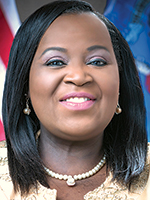 On Thursday, Representative Shelia Stubbs (D) tweeted that she plans to resign from the Assembly if confirmed by the Dane County Board of Supervisors to serve as the new Human Services Director. Rep. Stubbs was selected two weeks ago by Dane County Executive Joe Parisi to serve in this new role. On her nomination, Rep. Stubbs said, “County government makes an impactful difference in the lives of so many and I’m honored to have the opportunity to return to what I consider ‘home. Dane County Human Services has a long, proud legacy in this community and I’m grateful to the County Executive for this opportunity to lead this important work.” This tweet comes days after Rep. Stubbs indicated her plans to continue serving in the Assembly if confirmed by the Dane County Board of Supervisors. If she resigns, the Governor will need to reschedule a special election to fill her seat. In the meantime, Republicans would be one vote closer to a supermajority in the Assembly.
On Thursday, Representative Shelia Stubbs (D) tweeted that she plans to resign from the Assembly if confirmed by the Dane County Board of Supervisors to serve as the new Human Services Director. Rep. Stubbs was selected two weeks ago by Dane County Executive Joe Parisi to serve in this new role. On her nomination, Rep. Stubbs said, “County government makes an impactful difference in the lives of so many and I’m honored to have the opportunity to return to what I consider ‘home. Dane County Human Services has a long, proud legacy in this community and I’m grateful to the County Executive for this opportunity to lead this important work.” This tweet comes days after Rep. Stubbs indicated her plans to continue serving in the Assembly if confirmed by the Dane County Board of Supervisors. If she resigns, the Governor will need to reschedule a special election to fill her seat. In the meantime, Republicans would be one vote closer to a supermajority in the Assembly.
A Look at the Week Ahead
- Assembly members were told to keep Wednesday, May 17 open for a floor session.
- View the WisEye schedule for JFC meetings next week: click here
Fundraising Opportunities
A list of all upcoming fundraiser opportunities can be found by clicking the button below. For any questions or more information, please do not hesitate to contact your Michael Best Strategies contact.


